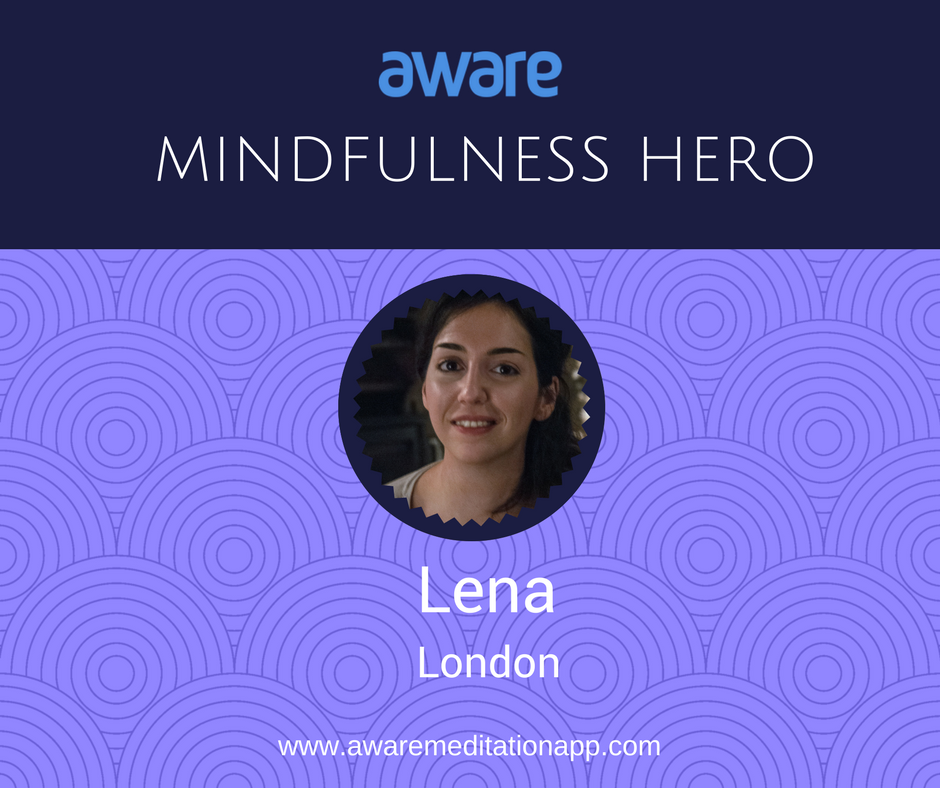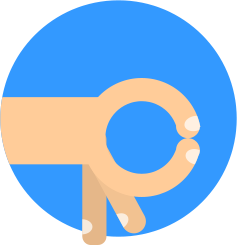
22 Jun Moments of Clear Cut Clarity with our Mindfulness Hero: Lena!
We hope you enjoy reading this blog as much as we did writing it!
It was amazing to chat with our Mindfulness Hero Lena as she talks about her experiences of thoughts being so crippling that she couldn’t stop her brain from over populating her mind with fear and depression. She even compares her brain ( before mindfulness ) to that of a little child that either gets too enthusiastic and starts jumping from thought to thought or overwhelmed and scared by scary scenarios.
We are so proud of her insights because they sound like the words of someone who is confident in the mindfulness practice, and someone who has truly tamed her inner demons and achieved high levels of clarity and enlightenment by sticking to the practice of meditation.
Let’s begin the very inspiring story of Lena and how the fruitful purpose of this habit can help you too!
Meditation to me, means the practice of purposefully stirring your attention to the present moment, the surrounding sounds, music, smells, flavours, a specific bodily sensation, regardless of how unpleasant they might feel and staying there with your awareness - who you truly are, without letting your mind and the little voice in it that we call: “thought”, gain your attention with a negative or unhelpful comment. What is, just is, so let it be and experience it.
A lot of people expect meditation to work in an instant. However, once your mind gains momentum and it starts firing off thoughts one after another (you either experience this in periods of stress, anxiety and depression) it needs time to consciously train your awareness to pay attention to the present moment or ‘what is’ instead of following your mind whenever and wherever the mind pleases. When I experienced anxiety and depression, my mind was a constant mess. My thoughts were scary and intense. One was fear and the other was a “what if scenario” which one after the other - paralyzed me because I let my awareness be consumed by my super busy brain. However, in a moment of clarity, I realized that I could not be my thoughts. The reason was that I realized that I was the one experiencing the thoughts my brain was producing. I had no control over them, but I got upset from them. I experienced emotional and physical reactions to what my brain was throwing into my awareness’s spectrum; scenarios that might never be, questions there are no answers to; my body however, operated independently. With this I mean, my body would get up and go to my bedroom while my mind was thinking about all the scary existential thoughts one could have. How could it be that without thinking: “I want to go to my bedroom”, I actually did go?
I did, because I am not my brain.In order to calm your mind down, you need to guide your awareness (yourself) to pay attention to what is around you, rather than to your brain. Your brain will eventually quiet down and you will experience moments of stillness. All there will be, is what is real, and you. You just need to stick with it and also practice tasks or hobbies that need your conscious awareness so as to engage your brain to the present moment purposefully.
Just like anyone suffering from a mental health disorder, I wanted and still want a quick fix. Mindfulness won’t give you that but I am convinced that the more you do it, the quieter your mind will be as your awareness and focus grow stronger in being in touch with the present moment.
Just like when you are learning a language or learning to draw, you are trying to teach your mind a new skill - in this case, it is the skill of directing attention where you want it, not where your brain wants it.I imagine my brain like a little child that either gets too enthusiastic and starts jumping from thought to thought or overwhelmed and scared by scary scenarios. Likewise, you need to be patient with it and persist in bringing your awareness down to the present moment in order for your brain to say..oh..ok..you’re not giving me the attention I want so I will stop bothering you as much - show your mind that your awareness (you) are the boss whenever it takes you to places you don’t want to be or there is no point in being (i.e. overthinking a situation - what is the benefit in doing that?)
Aware is seriously the best application I have ever bought and I use it almost daily, mostly just before I go to bed.Months ago, I had a voucher of £5 to spend on any app I wanted as I was suffering from anxiety and knew the positive effects of mindfulness. I tried to find an application that seemed decent and the people behind it did not ask me for a monthly subscription or ridiculous amounts of money. I read the reviews and saw the content and I thought, this app looked reasonable and the people behind it sounded knowledgeable and passionate.It is a positive, non-money driven app, kind, calm and offers a lot of knowledge - it is an investment I will never regret - I don’t even get enthusiastic easily but I have recommended it to my friends and counselor who has recommended it to others too. If any of these people download the app, I know I have done something good and I play a tiny role in making people happier!I am looking forward to every update aware does as it keeps being improved.




Catherine S. Stewart
Posted at 06:21h, 18 SeptemberThank you, Lena, for your insights! You have definitely played MUCH more than “a tiny role” in the happiness of others. I loved the way you expressed how to be a non-judgemental observer of your own mind & your thoughts.
I also really liked your suggestion to engage in hobbies that require your full attention. I have been coloring all my life (even before it was a fad)! Journaling also helps me to focus & express my thoughts. ✒
Catherine